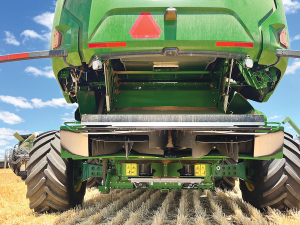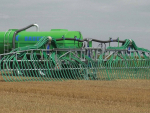John Deere's X-Series Combine Harvesters can now be complemented by the advanced weed control capability of Redekop’s Seed Control Unit (SCU) which destroys harvestable weed seeds in a single pass.
The Redekop SCU mounts to the combine chopper and injects processed chaff directly into the residue stream for excellent distribution over the entire cutting width. In doing so, it destroys weed seed, helping to manage weed resistance for the next seasons.
Mounted behind the cleaning shoe of the harvester and fully integrated with the machine, the system is designed to work in all crop conditions using one set of mills, negating the need to swap mills in response to changing crop or harvest conditions.
The reversible mills can destroy up to 98% of harvestable seeds before the material is directed back to the residue stream, mixed with straw and spread evenly over the entire cutting width, to ensure minimal weed pressure and better crop establishment in subsequent seasons.
SCU for X-Series will be available from 1 February, following three years of testing on X-Series working in Canada, Australia and Germany. JD Production System Manager, Ben Kelly, said all the benefits already seen with the SCU on S-Series Harvesters are now available to the owners and operators of X-Series.
“The SCU is already a proven performer on the smaller S-Series and we are excited to have collaborated with the team at Redekop to adapt the technology to be suited to the power and capacity of the bigger machines,” Kelly said.
“The collaboration with Redekop now opens the door for the X9 to be fitted with an effective weed control system, helping to grow the efficiency of small grain and cereal cropping operations.”
Redekop’s Trevor Thiessen said the trials of the past three years had created an iteration of SCU that could manage the additional volume presented by the X-Series, without compromising throughput.
“The X9 has significantly more capacity than the S-Series, so we had to ensure the mills taking the material off the rear of the harvester could manage that,” Thiessen explained. “We tested in Australia and Canada, but we were particularly concerned about the amount of MOG it would encounter in European conditions. Testing in high yielding German wheat and barley crops of up to 11.5 tonnes/ha, gave us confidence the unit could perform anywhere.”
Redekop worked closely with JD using a pre-production X9 for initial fit-up, fabrication, and design tweaks, with fine tuning of air flow, shoe pressure, load limits on the drive line and other key components. The SCU is fully integrated with the G5PLUS CommandCenter and can be easily engaged or disengaged as required.



















